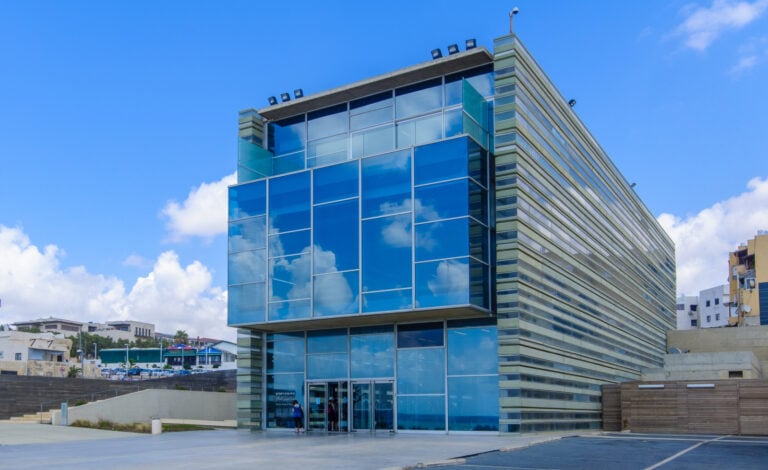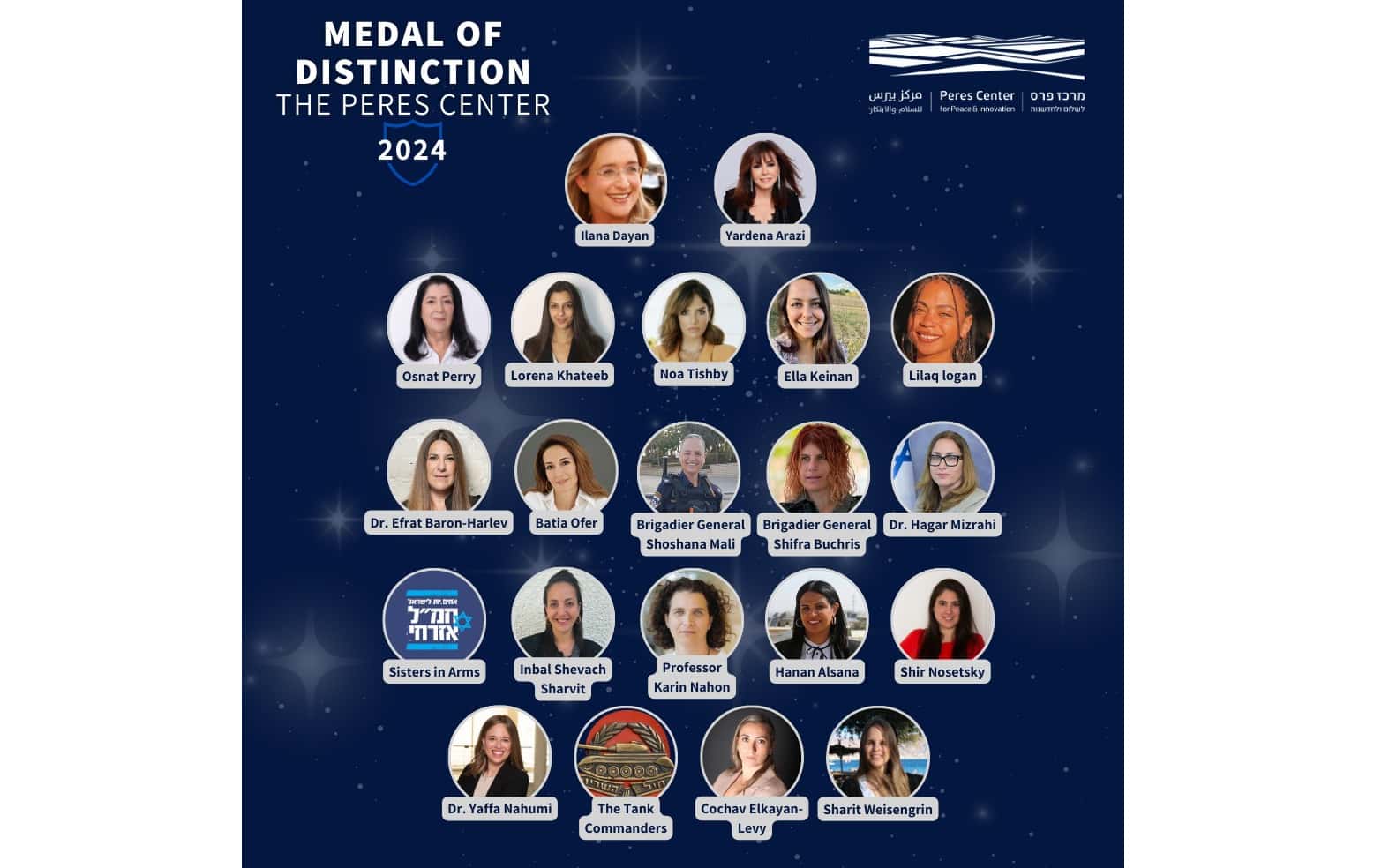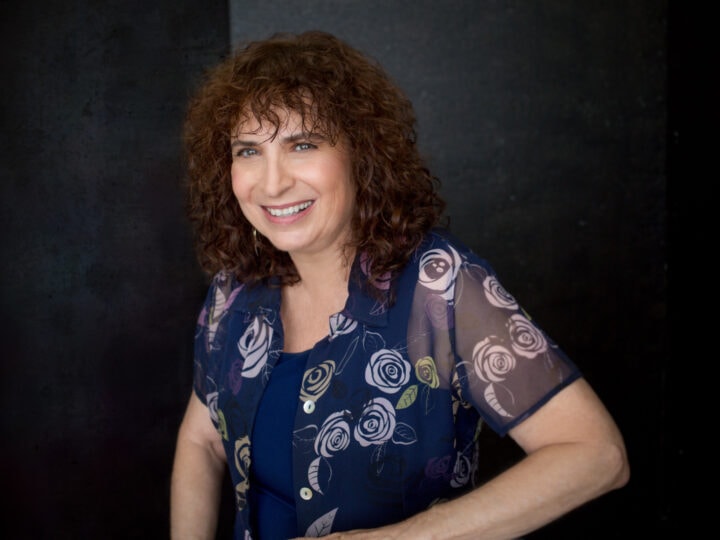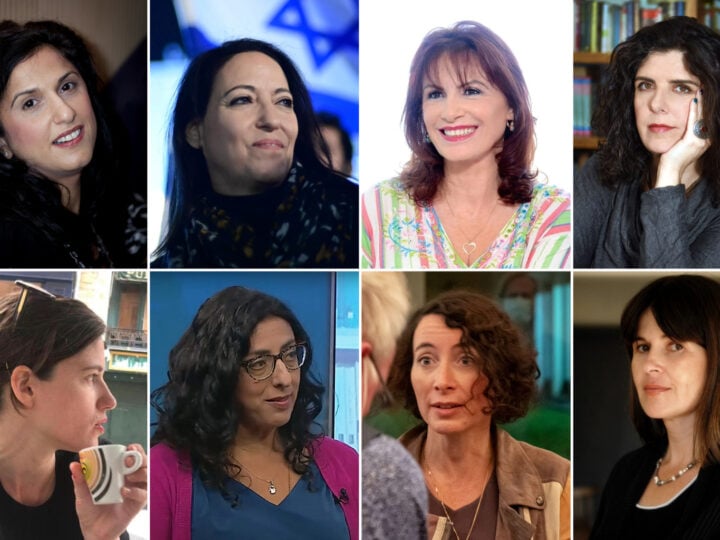Ahead of International Women’s Day on March 8, the Peres Center for Peace and Innovation will bestow medals of distinction upon 20 women and groups of women who have demonstrated bravery, initiative, determination and leadership on the battlefield and the home front since October 7.
“This marks the fourth year in which the Peace and Innovation Center honors our unique Medal of Distinction award to influential, trailblazing women who inspire change,” said Efrat Duvdevani, director of the Peres Center.
“This year’s ceremony will shed light on the bravery, initiative, selflessness and resilience demonstrated by heroines since the October 7, across a wide spectrum of fields – from civilian initiatives to medicine, education, and international law, to aiding the families of captives, locating missing individuals, and beyond.”

At the awards ceremony, to take place February 28 at the Peres Center in Jaffa, women who were taken hostage by Hamas – both those who have returned home and those who are still in captivity — will be recognized with a special medal as well.
The awardees include:
- Presenter and actress Noa Tishby. She has been at the forefront of Israeli advocacy for over 20 years. Since October 7, she has advocated against antisemitism and for the release of captives, spreading her message in explanatory videos to the film industry, on American television, and to the White House.
- Lilaq Logan from the Black Hebrews community in Dimona. Alongside her service in the Air Force, Logan has engaged in Israeli advocacy through highly viral online videos combating incitement and misinformation against Israel. Her grandmother was killed in a terror attack in 2016.
- Lorena Khateeb-Kizel from the Arab Druze community. She has contributed to educational Israel advocacy in the Arab world in Arabic, English and Hebrew, and prepared food packages for soldiers. She and two partners started the “Arab in the Living Room” initiative after October 7 to support residents of Gaza border communities and promote Arabic language accessibility among the Jewish community for free and on a voluntary basis. She recently launched culinary tours for Druze women with Asif.
- Prof. Cochav Elkayam-Levy, an attorney and law professor specializing in international law, gender, and human rights defense. She heads the Civil Ombudsman for Gender Crimes committed by Hamas against women, men, and children on October 7.
- Brigadier General Shifra Buchris, a border police officer. She took three soldiers from her team on an unauthorized rescue mission on October 7 in their private vehicles. For 12 hours, they traveled back and forth from the Supernova party to the evacuation point, saving numerous people from death and evacuating severely wounded individuals, all while risking their own lives.
- Brigadier General Shoshana Mali, a veteran police officer in Sderot. On the morning of October 7, she opened fire on approaching terrorists. A grenade was thrown at her, and she caught it and threw it back toward the terrorists. During the battle, Mali was injured but did not stop fighting until her ammunition ran out.
- Prof. Karine Nahon, who established and led the Missing and Captive Unit in the Civilian Homefront Command volunteer group. She was responsible for dealing with family of those missing while recruiting volunteers to scour video images and use AI tools to determine the status of thousands of missing persons in the weeks after October 7.
- Dr. Hagar Mizrahi, head of the medical division and chairman of the medical committee that assessed the condition of the hostages.
- Sisters in Arms, part of the Brothers in Arms organization that began before the war as a protest organization. After October 7, these activists became a leading civil aid organization, treating the wounded, locating the missing, preparing food for the soldiers, gathering equipment for the evacuees, and helping ruined farms.
- Dr. Efrat Baron-Harlev, director of Schneider Children’s Medical Center, where mothers and children released from Hamas captivity were admitted. She enlisted the Ministry of Health in the early establishment of a facility dedicated to their reception and led the medical and psychological teams at the hospital to develop methods and models that did not exist in professional literature.
- Osnat Perry, a resident of Kibbutz Nir Oz who managed to escape while her husband was abducted to Gaza. She led the construction of a rehabilitation and recovery plan for Kibbutz Nir Oz and implemented it as the kibbutz moved to the neighborhood of Karmei Gat in Kiryat Gat, while continuing the agricultural and business activities of the kibbutz.
- Tank commanders Hagar, Hila, Tal, Sarah, Michal, Karni, Ophir and Tamar. These women warriors killed dozens of terrorists on October 7 at the site of the Supernova party, keeping them from invading nearby kibbutzim.
- Attorneys Hanan Alsana and Shir Nosatzky. With several partner organizations, they opened a Jewish-Arab support network in the Negev Bedouin city of Rahat, to assist Jewish and Arab families affected by the events of October 7.
- Inbal Shevach Sharvit, a communications professional and producer on the “Good Evening with Guy Pines” nightly entertainment program. Immediately with the outbreak of the war, she established Inbal’s Home Front Command, whose volunteers bring food and equipment to soldiers and evacuees.
- Dr. Yaffa Nahumi, who initiated a haredi charitable effort to assist soldiers as well as bereaved. In addition, Nahumi established a team dealing with procurement and movement of equipment worth millions of dollars donated by foreign donors.
- Travel blogger Ella Kenan, who leveraged her influencer status to educate the world about realities in Israel. She initiated the campaign that reached US President Joe Biden, “Hamas is ISIS,” and defended Israel on the BBC and by attacks from environmental activist Greta Thunberg.
- Sharit Weisengrin, a finance manager who has taken upon herself to manage a resilience center in Eilat since the war broke out. She leads a coalition of the local authorities, educators, parents and youth in planning and executing hundreds of activities in which over 18,000 displaced children have participated in the last four months.
- Recording artist Yardena Arazi, who has been visiting wounded soldiers and evacuees, and assisting families of the abducted. Her song “Home,” written by Ehud Manor about the Lebanon War, became the anthem of the families’ struggle.
- Veteran TV journalist Ilana Dayan. On her show, “Uvda,” she has brought to the screen the face of Israel and Israelis in this war: the compelling stories of the heroes, the hostages, the residents of the border communities, and the soldiers, alongside investigative articles on the failures that led to the disaster.
- Philanthropist Batia Ofer, chair of the Royal Academy of Arts Trust in Britain and a warrior in the fight against antisemitism in universities since October 7. Following her lead, hundreds of donors canceled donations to academic institutions in the United States in protest of antisemitism. She and her family donated millions of shekels to organizations assisting IDF soldiers at, bereaved families, evacuees, and the Israeli public affected by the war.
Fighting for Israel's truth
We cover what makes life in Israel so special — it's people. A non-profit organization, ISRAEL21c's team of journalists are committed to telling stories that humanize Israelis and show their positive impact on our world. You can bring these stories to life by making a donation of $6/month.








